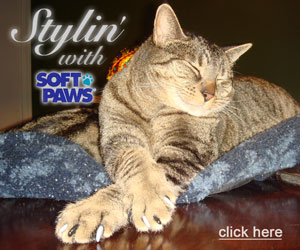How to Play with a Cat That Tends to Scratch You

Do you have a cat that tends to use her claws a lot while playing? If you're avoiding playing with your cat because she sometimes scratches you during playtime, consider these tips and ideas.
Teach Your Cat Not to Use Claws
Cats use their claws normally while playing. It's one of those things, though, that isn't appropriate when a cat is playing with a human. Cat scratches can be dangerous for people, so it's critical to avoid them. When they live with humans, cats need to be taught what is and isn't acceptable behavior, and not using claws while playing is one of those things.
While playing with your cat, if you feel her claws, withdraw from the play session for a few moments. Turn your back and do something else for a minute, and then come back and try again. This works especially well for kittens, who quickly learn that if they don't want their play sessions with you to end, they will make sure their claws don't touch your skin.
Always Play with a Toy
Never use your hands or feet to directly wrestle and play with your cat. Always use a toy as an intermediary, so your cat doesn't learn that it's OK to scratch or bite human skin.
Wand toys are great for cats because, not only do they provide distance between your hands and arms and your cat's teeth and claws, but they also allow your cat to feel like a predator chasing prey. This type of predator-prey play is crucial for cats' wellbeing.
Keep Your Cat's Claws Trimmed
Routinely trimming your cat's claws can help protect you from scratches. Trim the end hooks of the claws off once a week to make them less able to penetrate and catch on skin, clothing, or upholstery. Just be aware that the claws can feel a little sharper for an hour or two after trimming because there will be a rough edge there until it's worn down a bit.
Teach Your Cat to Play Fetch
Cats can learn to play fetch with throw toys, and that can be a great way to play with a cat that has a tendency to scratch. Find a great toy that your cat likes, and toss it a tiny distance away from you. When she goes toward it, give her verbal praise and give her a treat. Slowly work up to having her go grab the toy before praising her. Then, start calling her over to you once she has the toy in her mouth, offering a treat as a reward. Over time, your cat should learn to play fetch, and you can avoid contact with errant claws.
Consider Soft Paws®
Covering your cat's claws with vinyl claw caps can protect you from being scratched while playing with her. They are easy to apply, and the caps themselves and the glue, once dried, are non-toxic. They don't interfere with the ability to retract and extend the claws, and they don't hurt the cat or have an infection risk associated with them.
Soft Paws® not only help protect you and others from cat scratches, but they can also help protect your furniture and other belongings. They still allow a cat to use a scratching post for exercise and fun, but they dull the nails and make them less likely to cause damage.




